|
Books Should Be Free Loyal Books Free Public Domain Audiobooks & eBook Downloads |
|
|
Books Should Be Free Loyal Books Free Public Domain Audiobooks & eBook Downloads |
|
Fiction |
|---|
|
Book type:
Sort by:
View by:
|
By: Alexandre Dumas (1802-1870) | |
|---|---|
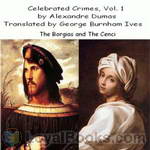 Celebrated Crimes
Celebrated Crimes
Dumas's 'Celebrated Crimes' was not written for children. The novelist has spared no language -- has minced no words -- to describe the violent scenes of a violent time.In some instances facts appear distorted out of their true perspective, and in others the author makes unwarranted charges. The careful, mature reader, for whom the books are intended, will recognize, and allow for, this fact.The first volume comprises the annals of the Borgias and the Cenci. The name of the noted and notorious Florentine family has become a synonym for intrigue and violence, and yet the Borgias have not been without stanch defenders in history... | |
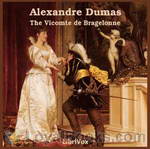 The Vicomte De Bragelonne
The Vicomte De Bragelonne
After The Three Muskateers and Twenty Years After the adventurous story of Athos, Porthos, Aramis and D'Artagnan continues!The Vicomte of Bragelonne: Ten Years Later (French: Le Vicomte de Bragelonne ou Dix ans plus tard) is the last of the Musketeer novels. It is usually divided into four volumes and this first volume contains chapters 1-75. | |
 The Black Tulip
The Black Tulip
The Black Tulip, written by Alexandre Dumas père and published in 1850, is a historical novel placed in the time of Tulipmania in the Netherlands. The novel begins with the 1672 politically motivated mob lynching of the de Witt brothers and then follows the story of Cornelius van Baerle, godson of Cornelius de Wit. Cornelius Van Baerle has joined the race to breed a truly black tulip – and to win the prize of 100,000 guilders, as well as fame and honour. As he nears his goal he is jailed and then of course rescued – by the beautiful Rosa, daughter of the jailer. | |
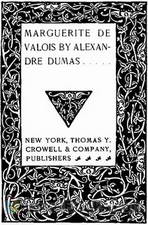 Marguerite de Valois
Marguerite de Valois
A historical fiction novel set in Paris (1572) during Charles IX's reign and the French Wars of Religion. Marguerite de Valois, daughter of deceased Henry II, is the novel's protagonist set against the infamous schemes of the Catholic power player, Catherine de Medici. | |
By: Daniel Defoe | |
|---|---|
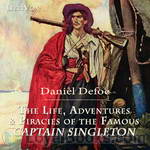 The Life, Adventures & Piracies of Captain Singleton
The Life, Adventures & Piracies of Captain Singleton
The Life, Adventures & Piracies of the Famous Captain Singleton is a "bipartite adventure story whose first half covers a traversal of Africa, and whose second half taps into the contemporary fascination with piracy. It has been commended for its depiction of the homosexual relationship between the eponymous hero and his religious mentor, the Quaker, William Walters.". | |
By: Oscar Wilde (1854-1900) | |
|---|---|
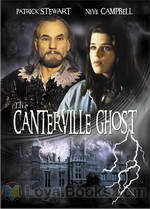 The Canterville Ghost
The Canterville Ghost
An American diplomat's family moves into an ancient stately mansion. They're warned by the owner that it is haunted by a most horrifying and gruesome spirit who had once cruelly murdered his own wife. The story progresses with creaking floor boards, mysterious passages, dark attics, clanking chains, and weird howling. Yet, the reader is totally unprepared for Oscar Wilde's brand of tongue in cheek humor as he takes all the ingredients of a traditional ghost story and turns it on its head, and creates a hilarious parody instead of a morbid saga! The Canterville Ghost was the first of Oscar Wilde's short stories to be published... | |
 The Happy Prince and Other Tales
The Happy Prince and Other Tales
The Happy Prince and Other Tales (also sometimes called The Happy Prince and Other Stories) is an 1888 collection of stories for children by Oscar Wilde. It is most famous for The Happy Prince, the short tale of a metal statue who befriends a migratory bird. Together, they bring happiness to others, in life as well as in death. The stories included in this collection are:The Happy PrinceThe Nightingale and the RoseThe Selfish GiantThe Devoted FriendThe Remarkable RocketThe stories convey an appreciation for the exotic, the sensual and for masculine beauty. | |
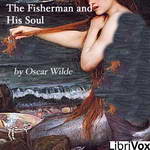 The Fisherman and His Soul
The Fisherman and His Soul
”The Fisherman and his Soul” is a fairy tale first published in November of 1891 in Wilde’s “A House of Pomegranates”. It tells of a fisherman who nets and falls in love with a mermaid. But to be with her he must shed his soul, which goes off to have adventures of its own. Will forbidden love endure? | |
 The Soul of Man
The Soul of Man
“(T)he past is what man should not have been. The present is what man ought not to be. The future is what artists are.”Published originally as “The Soul of Man Under Socialism,” this is not so much a work of sober political analysis; rather it can be summed up as a rhapsodic manifesto on behalf of the Individual. Socialism having deployed technology to liberate the whole of humanity from soul-destroying labour, the State obligingly withers away to allow the free development of a joyful, anarchic hedonism... | |
By: Herman Melville (1819-1891) | |
|---|---|
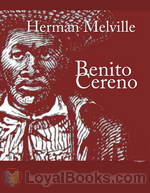 Benito Cereno
Benito Cereno
On an island off the coast of Chile, Captain Amaso Delano, sailing an American sealer, sees the San Dominick, a Spanish slave ship, in obvious distress. Capt. Delano boards the San Dominick, providing needed supplies, and tries to learn from her aloof and disturbed captain, Benito Cereno, the story of how this ship came to be where she is. Dealing with racism, the slave trade, madness, the tension between representation and reality, and featuring at least one unreliable narrator, Melville's novella has both captivated and frustrated critics for decades. | |
 Omoo: A Narrative of Adventures in the South Seas
Omoo: A Narrative of Adventures in the South Seas
Omoo: A Narrative of Adventures in the South Seas is Herman Melville's sequel to Typee, and, as such, was also autobiographical. After leaving Nuku Hiva, the main character ships aboard a whaling vessel which makes its way to Tahiti, after which there is a mutiny and the majority of the crew are imprisoned on Tahiti. The book follows the actions of the narrator as he explores Tahiti and remarks on their customs and way of life.Many sources incorrectly assert that Omoo is based on Melville's stay in the Marquesas. The novel is, in fact, exclusively based on his experiences in the Society Islands. | |
 The Confidence-Man: His Masquerade
The Confidence-Man: His Masquerade
The Confidence-Man: His Masquerade was the last major novel by Herman Melville, the American writer and author of Moby-Dick. Published on April 1, 1857 (presumably the exact day of the novel's setting), The Confidence-Man was Melville's tenth major work in eleven years. The novel portrays a Canterbury Tales-style group of steamboat passengers whose interlocking stories are told as they travel down the Mississippi River toward New Orleans. The novel is written as cultural satire, allegory, and metaphysical treatise, dealing with themes of sincerity, identity, morality, religiosity, economic materialism, irony, and cynicism... | |
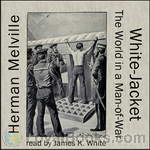 White Jacket, or The World in a Man-of-War
White Jacket, or The World in a Man-of-War
This is a tale based on Melville's experiences aboard the USS United States from 1843 to 1844. It comments on the harsh and brutal realities of service in the US Navy at that time, but beyond this the narrator has created for the reader graphic symbols for class distinction, segregation and slavery aboard this microcosm of the world, the USS Neversink. (Introduction by James K. White) | |
 The Encantadas, Or Enchanted Isles
The Encantadas, Or Enchanted Isles
The Encantadas or Enchanted Isles is a novella by American author Herman Melville. First published in Putnam's Magazine in 1854, it consists of ten philosophical "Sketches" on the Encantadas, or Galápagos Islands. It was collected in The Piazza Tales in 1856. The Encantadas was to become the most critically successful of that collection. All of the stories are replete with symbolism reinforcing the cruelty of life on the Encantadas. (Introduction excerpted from Wikipedia) | |
By: G. K. Chesterton (1874-1936) | |
|---|---|
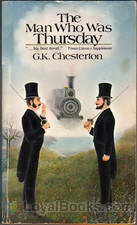 The Man Who was Thursday
The Man Who was Thursday
Two poets in a London park at sunset, debating on the attributes of poetry and whether it's really a metaphor for anarchy. A group that meets in secret, planning to overthrow the world order. Disguises and deceptions, ideals and ideology. A medley of themes and genres makes this a great read for anyone who's a fan of Chesterton and his iconic Father Brown. The Man Who Was Thursday includes Chesterton's favorite theme of Christianity with touches of delightful humor to enliven the twists and turns that abound throughout the book... | |
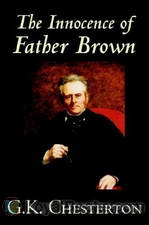 The Innocence of Father Brown
The Innocence of Father Brown
A Chief of Police hosts a dinner party for an American millionaire wishing to will his entire fortune to the Church of France. Jewels that have been stolen and recovered so many times that they're known colloquially by thieves as The Flying Stars. A murder committed by an invisible man. These and many others are the mysteries that are presented to the lovable, bumbling, stumpy Man of God, Father Brown. The Innocence of Father Brown, by G.K. Chesterton is a collection of eleven stories which marks the debut of this most unusual detective... | |
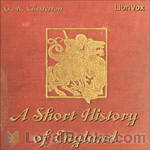 A Short History of England
A Short History of England
Gilbert Keith Chesterton was a prolific writer on many topics. His views of history were always from the standpoint of men and their interactions, and it may fairly be said he saw all of history as a battle between civilization and barbarism. So it has always been, and that remains true even today.“But it is especially in the matter of the Middle Ages that the popular histories trample upon the popular traditions. In this respect there is an almost comic contrast between the general information... | |
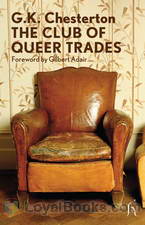 The Club of Queer Trades
The Club of Queer Trades
A collection of six wonderfully quirky detective stories, featuring the ‘mystic’ former judge Basil Grant. Each story reveals a practitioner of an entirely new profession, and member of the Club of Queer Trades. | |
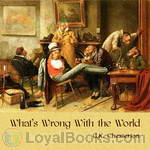 What's Wrong With the World
What's Wrong With the World
Gilbert Keith Chesterton (1874–1936) has been called the “prince of paradox.” Time magazine observed of his writing style: “Whenever possible Chesterton made his points with popular sayings, proverbs, allegories—first carefully turning them inside out.” His prolific and diverse output included journalism, philosophy, poetry, biography, Christian apologetics, fantasy and detective fiction. The title of Chesteron’s 1910 collection of essays was inspired by a title given to him two years earlier by The Times newspaper, which had asked a number of authors to write on the topic: “What’s wrong with the world?”... | |
 Eugenics and Other Evils
Eugenics and Other Evils
Most Eugenists are Euphemists. I mean merely that short words startle them, while long words soothe them. And they are utterly incapable of translating the one into the other, however obviously they mean the same thing. Say to them “The persuasive and even coercive powers of the citizen should enable him to make sure that the burden of longevity in the previous generation does not become disproportionate and intolerable, especially to the females”; say this to them and they will sway slightly to and fro like babies sent to sleep in cradles. Say to them “Murder your mother,” and they sit up quite suddenly. Yet the two sentences, in cold logic, are exactly the same.” | |
 Miscellaneous Essays
Miscellaneous Essays
These nine files are miscellaneous short essays or stories from G. K. Chesterton. They were chosen for not only their brevity but also for being shining exemplars of Chesterton’s wit and whimsy. A fun but powerful introduction into the mind of the man that is G. K. Chesterton. | |
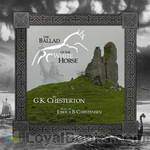 The Ballad of the White Horse
The Ballad of the White Horse
An English epic poem that follows the exploits of Alfred the Great in his defense of Christian civilization in England from the heathen nihilism of the North. Following a string of defeats at the hands of the invading Danes, a vision from heaven in the river island of Athelney fills Alfred with joy and hope. Though it gives no promise of victory in the coming struggle, it inspires him to rally his chieftains for a last stand against the invading hordes. His adventures lead throughout the country... | |
 Alarms and Discursions
Alarms and Discursions
Gilbert Keith Chesterton was an influential English writer of the early 20th century. His prolific and diverse output included journalism, philosophy, poetry, biography, Christian apologetics, fantasy, and detective fiction. Chesterton has been called the “prince of paradox.” He wrote in an off-hand, whimsical prose studded with startling formulations. Chesterton wrote about 4000 essays on various subjects, and “Ararms and Discursions is one of his collections. | |
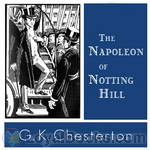 The Napoleon of Notting Hill
The Napoleon of Notting Hill
While the novel is humorous (one instance has the King sitting on top of an omnibus and speaking to it as to a horse: “Forward, my beauty, my Arab,” he said, patting the omnibus encouragingly, “fleetest of all thy bounding tribe”), it is also an adventure story: Chesterton is not afraid to let blood be drawn in his battles, fought with sword and halberd in the London streets, and Wayne thinks up a few ingenious strategies; and, finally, the novel is philosophical, considering the value of one man’s actions and the virtue of respect for one’s enemies. | |
 What I Saw in America
What I Saw in America
“Let me begin my American impressions with two impressions I had before I went to America. One was an incident and the other an idea; and when taken together they illustrate the attitude I mean. The first principle is that nobody should be ashamed of thinking a thing funny because it is foreign; the second is that he should be ashamed of thinking it wrong because it is funny.” (Gilbert Keith Chesterton) | |
 The New Jerusalem
The New Jerusalem
“On the road to Cairo one may see twenty groups exactly like that of the Holy Family in the pictures of the Flight into Egypt; with only one difference. The man is riding on the ass.” “The real mistake of the Muslims is something much more modern in its application than any particular passing persecution of Christians as such. It lay in the very fact that they did think they had a simpler and saner sort of Christianity, as do many modern Christians. They thought it could be made universal merely by being made uninteresting... | |
 The Crimes of England
The Crimes of England
“Second, when telling such lies as may seem necessary to your international standing, do not tell the lies to the people who know the truth. Do not tell the Eskimos that snow is bright green; nor tell the negroes in Africa that the sun never shines in that Dark Continent. Rather tell the Eskimos that the sun never shines in Africa; and then, turning to the tropical Africans, see if they will believe that snow is green. Similarly, the course indicated for you is to slander the Russians to the English and the English to the Russians; and there are hundreds of good old reliable slanders which can still be used against both of them... | |
 Manalive
Manalive
The flying blast struck London just where it scales the northern heights, terrace above terrace, as precipitous as Edinburgh. It was round about this place that some poet, probably drunk, looked up astonished at all those streets gone skywards, and (thinking vaguely of glaciers and roped mountaineers) gave it the name of Swiss Cottage, which it has never been able to shake off. At some stage of those heights a terrace of tall gray houses, mostly empty and almost as desolate as the Grampians, curved... | |
 The Defendant
The Defendant
A collection of reprinted articles on a wide-range of subject, all in the unique style of G. K. Chesterton. Using wit, paradox, and good humor he “defends” a series of seeming harmless things that need no defense, and in so doing he exposes many of the broken assumptions and dogmatic notions of secular humanism and other trends of his age and of ours. | |
 The Appetite of Tyranny
The Appetite of Tyranny
“Unless we are all mad, there is at the back of the most bewildering business a story: and if we are all mad, there is no such thing as madness. If I set a house on fire, it is quite true that I may illuminate many other people’s weaknesses as well as my own. It may be that the master of the house was burned because he was drunk; it may be that the mistress of the house was burned because she was stingy, and perished arguing about the expense of the fire-escape. It is, nevertheless, broadly true that they both were burned because I set fire to their house. That is the story of the thing. The mere facts of the story about the present European conflagration are quite as easy to tell.” | |
 Tremendous Trifles
Tremendous Trifles
“None of us think enough of these things on which the eye rests. But don’t let us let the eye rest. Why should the eye be so lazy? Let us exercise the eye until it learns to see startling facts that run across the landscape as plain as a painted fence. Let us be ocular athletes. Let us learn to write essays on a stray cat or a coloured cloud. I have attempted some such thing in what follows; but anyone else may do it better, if anyone else will only try. ” (Gilbert Keith Chesterton) | |
 Varied Types
Varied Types
Another delightful and sharply pointed excursion into the topics of the day, and of our day as well, with Gilbert Keith Chesterton. Here he uses his wit and mastery of paradox to bring into focus a number of historical persons who in many ways typify the people who presently shape our world and who in their own right have already shaped Western civilization. These reprinted magazine articles are filled with his good natured wit and devastating ability to use reductio ad absurdum to destroy the popular myths that drive our society at full-speed into, and expose the utter nonsense that underlies, secular humanism. You will come away with yet another new collection of wonderful quotes. | |
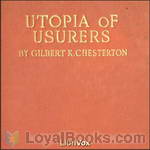 A Utopia of Usurers
A Utopia of Usurers
“Now I have said again and again (and I shall continue to say again and again on all the most inappropriate occasions) that we must hit Capitalism, and hit it hard, for the plain and definite reason that it is growing stronger. Most of the excuses which serve the capitalists as masks are, of course, the excuses of hypocrites. They lie when they claim philanthropy; they no more feel any particular love of men than Albu felt an affection for Chinamen. They lie when they say they have reached their position through their own organising ability... | |
 The Appreciations and Criticisms of the Works of Charles Dickens
The Appreciations and Criticisms of the Works of Charles Dickens
“These papers were originally published as prefaces to the separate books of Dickens in one of the most extensive of those cheap libraries of the classics which are one of the real improvements of recent times. Thus they were harmless, being diluted by, or rather drowned in Dickens. My scrap of theory was a mere dry biscuit to be taken with the grand tawny port of great English comedy; and by most people it was not taken at all–like the biscuit. Nevertheless the essays were not in intention so aimless as they appear in fact... | |
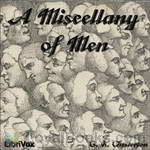 A Miscellany of Men
A Miscellany of Men
Gilbert Keith Chesterton was among the world’s most prolific writers who incorporated relentless logic, wonderful humor, and a clear view of truth into an amazing tool for exposing the foolishness of the policies of the world around him through the device of paradox.It is always great fun, and certainly always a learning experience to read Chesterton. A Miscellany of Men may be his hardest work to define, as it deals with a huge array of issues, using “personal types” as illustration. It would... | |
 Irish Impressions
Irish Impressions
“For the Irish Question has never been discussed in England. Men have discussed Home Rule; but those who advocated it most warmly, and as I think wisely, did not even know what the Irish meant by Home. Men have talked about Unionism; but they have never even dared to propose Union. A Unionist ought to mean a man who is not even conscious of the boundary of the two countries; who can walk across the frontier of fairyland, and not even notice the walking haystack. As a fact, the Unionist always shoots at the haystack; though he never hits it... | |
 The Trees of Pride
The Trees of Pride
Three trees, known as the Peacock trees, are blamed by the peasants for the fever that has killed many. Squire Vane scoffs at this legend as superstition. To prove them wrong, once and for all, he takes a bet to spend the night in the trees. In the morning he has vanished. Is he dead, and if so who has killed him? The poet? The lawyer? The woodsman? The trees? | |
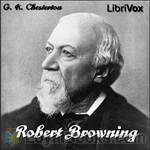 Robert Browning
Robert Browning
There is an old anecdote, probably apocryphal, which describes how a feminine admirer wrote to Browning asking him for the meaning of one of his darker poems, and received the following reply: “When that poem was written, two people knew what it meant–God and Robert Browning. And now God only knows what it means. | |
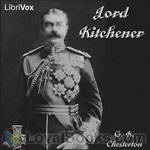 Lord Kitchener
Lord Kitchener
“The paradox of all this part of his life lies in this–that, destined as he was to be the greatest enemy of Mahomedanism, he was quite exceptionally a friend of Mahomedans.” | |
By: Louisa May Alcott (1832-1888) | |
|---|---|
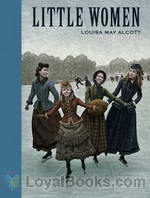 Little Women
Little Women
Set in nineteenth century New England, Little Women follows the lives of the four March sisters-Jo, Beth, Amy and Meg. The novel is a classic rites of passage story, that has often split literature critics but has been adored by many over the years. Intended as a book for young girls, the book is too sentimental for some but plenty of adults and young men have Little Women firmly featured in their best books of all time. The pace of the novel can be slow at times and the language almost too perfect but the overall sympathetic tone of Alcott wins over the reader... | |
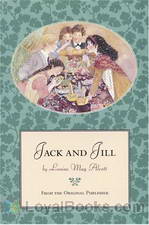 Jack and Jill
Jack and Jill
Louisa May Alcott, more famously known for her Little Women series, takes a familiar nursery rhyme and creates a whole novel out of it in one of her last books Jack and Jill: A Village Story. Though she continued to publish under the penname AM Barnard, this book probably marked the end of a particular writing phase in 1880. Jack and Jill is set in the fictional Harmony Village. On a December afternoon, the youngsters of the village are out enjoying the bracing cold and snow. The bright winter shines down as they have fun skating and sledding... | |
 An Old-Fashioned Girl
An Old-Fashioned Girl
Polly Milton, a 14-year-old country girl, visits her friend Fanny Shaw and her wealthy family in the city for the first time. Poor Polly is overwhelmed by the splendor at the Shaws’ and their urbanized, fashionable lifestyles, fancy clothes and some other habits she considers weird and, mostly, unlikable. However, Polly’s warmth, support and kindness eventually win her the hearts of all the family members. Six years later, Polly comes back to the city to become a music teacher. | |
 Shoes and Stockings: A Collection of Short Stories
Shoes and Stockings: A Collection of Short Stories
Here are tales of love and war, modesty and frivolity, laughter and tears. Louisa May Alcott wrote many, many short stories. This collection shares but 7 of them. | |
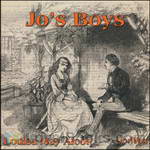 Jo's Boys
Jo's Boys
Jo’s Boys is the third book in the Little Women trilogy by Louisa May Alcott, published in 1886. In it, Jo’s “children”, now grown, are caught up in real world troubles. All three books – although fiction – are highly autobiographical and describe characters that were really in Alcott’s life. This book contains romance as the childhood playmates become flirtatious young men and women. The characters are growing up, going out into the world and deciding their futures. | |
 A Garland For Girls
A Garland For Girls
“These stories were written for my own amusement during a period of enforced seclusion. The flowers which were my solace and pleasure suggested titles for the tales and gave an interest to the work. If my girls find a little beauty or sunshine in these common blossoms, their old friend will not have made her Garland in vain.” – L.M. Alcott, September, 1887 | |
 Rose in Bloom
Rose in Bloom
Opening several years after the close of "Eight Cousins", we find Rose coming home fresh from a voyage overseas, to find much changed about her. Now of a marriageable age and heiress to a fortune, Rose finds joy,sorrow, and finally love await her -- as the Rose is finally ready to bloom into a good, strong, sweet and true woman.This sequel to Eight Cousins was written by Louisa May Alcott, the author of many well beloved children's books including Little Women, An Old Fashioned Girl, Under the Lilacs and more. | |
 Under the Lilacs
Under the Lilacs
"When two young girls decide to have a tea party with their dolls and a mysterious dog comes and eats their prized cake, they end up finding a circus run-away, Ben Brown. Ben is a horse master, and loves horses, so when the Moss' take the young boy in, they decide to give him work at the neighbors house driving cows (on a horse, of course). After that a series of events happens, and Ben finds out his beloved father is dead. Miss Celia, a neighbor, feels sorry and comforts him, and finally offers to let Ben stay with her and her fourteen-year-old brother, Thornton who is called Thorny... | |
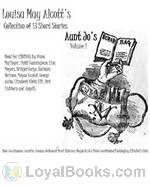 Aunt Jo's Scrapbag
Aunt Jo's Scrapbag
A collection of short stories by Louisa May Alcott that were written with the intent to entertain the whole family and to fill children's heads with wonder and delight. | |
 Work: A Story of Experience
Work: A Story of Experience
It is one of “several nineteenth-century novels [which] uncovers the changes in women’s work in the new industrial era, as well as the dilemmas, tensions, and the meaning of that work” The story depicts the struggles of a young woman trying to support herself. The main character, Christie Devon, works outside the home in a variety of different jobs, but the end of her story marks “the beginning of a new career as a voice and activist for other working women”. | |
 Flower Fables
Flower Fables
Flower Fables is Louisa May Alcott’s first book, penned at 16 for Ralph Waldo Emerson’s daughter, Ellen. | |
 The Mysterious Key and What It Opened
The Mysterious Key and What It Opened
In this delightful short story, we discover the secrets of the Trevlyn family. 'The Mysterious Key and What it Opened' is a mystery entwined with romance (Introduction by ashleighjane) | |
 Behind a Mask, or a Woman's Power
Behind a Mask, or a Woman's Power
Fans of Louisa May Alcott's Little Women will remember that her heroine Jo wrote racy novels before turning her hand to more "serious" literature. Alcott, writing under the pseudonym A. M. Barnard, often did the same, and Behind a Mask (1866) is one of her sensation novels. It focuses on Jean Muir, who enters the home of the wealthy Coventry family as governess to their sixteen-year-old daughter. But is the beguiling Miss Muir all that she seems to be? (Introduction by Elizabeth Klett) | |
 Shawl-Straps: A Second Series of Aunt Jo's Scrap-Bag
Shawl-Straps: A Second Series of Aunt Jo's Scrap-Bag
| |
 Spinning-Wheel Stories
Spinning-Wheel Stories
A group of stories-within-a-story, told in the classic Louisa May Alcott style. "I've a little cold," said the old lady, "and am too hoarse for talking, my dears; but Aunt Elinor has looked up a parcel of old tales that I've told her at different times and which she has written down. You will like to hear her reading better than my dull way of telling them, and I can help Minnie and Lotty with their work, for I see they are bent on learning to spin." The young folk were well pleased with grandma's proposal; for Aunt Nell was a favorite with all, being lively and kind and fond of children, and the only maiden aunt in the family... | |
By: Alan Edward Nourse (1928-1992) | |
|---|---|
 Five Stories by Alan Nourse
Five Stories by Alan Nourse
These Five Stories were written by Alan Edward Nourse, an American science fiction (SF) author and physician. He wrote both juvenile and adult science fiction, as well as nonfiction works about medicine and science. His SF works generally focused on medicine and/or psionics. Psionics refers to the practice, study, or psychic ability of using the mind to induce paranormal phenomena. Examples of this include telepathy, telekinesis, and other workings of the outside world through the psyche. | |
By: Victor Hugo (1802-1885) | |
|---|---|
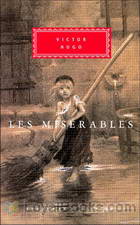 Les Misérables
Les Misérables
Victor Hugo's Les Misérables is a novel which tells the story of ex-convict Jean Valjean, his struggles and eventual redemption. It's hailed by many critics as not just Victor Hugo's finest work but also one of the best French novels of all time. Like most epic novels written in the 19th century, the storyline of Les Misérables spans through several decades beginning in the early 1800s and culminating in the 1832 June Rebellion in Paris. The events related to the lives of the central characters in the novel are also tied to the great historical events of the time from the French Revolution to the June Rebellion... | |
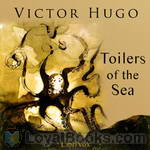 Toilers of the Sea
Toilers of the Sea
This is the story of a man’s monumental struggle against nature, to win the hand of the woman he loves, and surmount every difficulty that Nature puts in his path | |
 The Man Who Laughs
The Man Who Laughs
The Man Who Laughs is a novel by Victor Hugo, originally published in April 1869 under the French title L'Homme qui rit. Also published under the title "By Order of the King". (Introduction by Wikipedia) | |
By: P. G. Wodehouse (1881-1975) | |
|---|---|
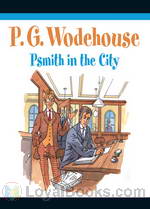 Psmith in the City
Psmith in the City
Mike’s dream of studying and playing cricket at Cambridge are thwarted as his father runs into financial difficulties. Instead, Mike takes on the job of clerk at the “New Asiatic Bank.” Luckily, school friend Psmith, with his boundless optimism and original views, soon joins his department, and together they endeavour to make the best of their new life in London. | |
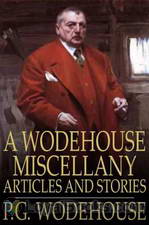 A Wodehouse Miscellany; Articles and Stories
A Wodehouse Miscellany; Articles and Stories
Sir Pelham Grenville Wodehouse was an English comic writer who enjoyed enormous popular success for more than seventy years. Best known today for the Jeeves and Blanding Castle novels and short stories, Wodehouse was also a talented playwright and lyricist who was part author and writer of fifteen plays and of 250 lyrics for some thirty musical comedies. | |